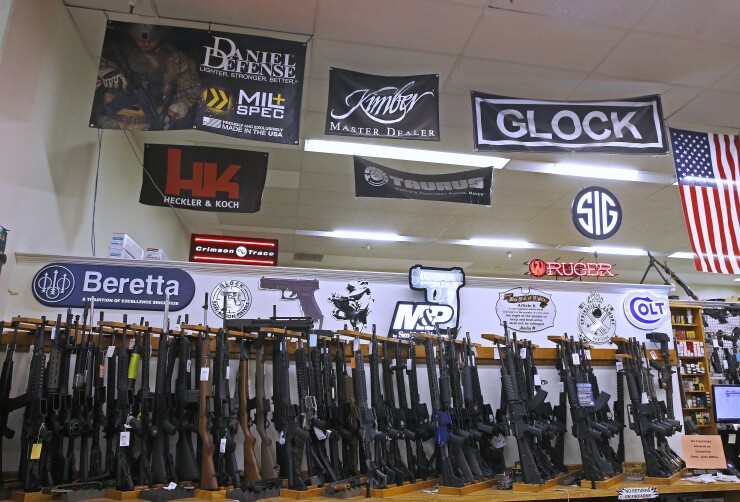If Congress won’t ban assault weapons, banks should do so on their own.
That was the argument made by The New York Times’ Andrew Ross Sorkin,
It’s an intriguing notion, one that immediately appealed to many gun control advocates who are frustrated by congressional inaction. Unfortunately, it’s also dangerous.
In essence, Sorkin’s proposal would be using banks to circumvent the political process, asking them to effectively ban the purchase of something that is legal. In doing so, it would elevate banks’ role to adjudicate a political dispute — and set a worrying precedent that could be employed in other cultural flash points.

Let’s be clear: This column is not about gun control. As the father of two young children, I’m appalled by the recent school shootings in Florida and far too many other places. And I sympathize with those who want policymakers to do something to make our kids safer, whether that’s gun control, better mental health treatment or some other means.
But such action should fall to the president and lawmakers, not big banks and credit card firms. It is not the role of financial companies to intercede here — nor should we want it to be.
One of Sorkin’s main arguments is that there is already precedent for this. He points to actions
But if that’s the case, Sorkin is off base in what banks are trying to do. Banks’ clear intent is to stop customers from using credit cards to bet in the market — and then leave financial institutions on the hook if the bet goes south. Because most credit cards allow a 30-day grace period to pay back purchases without interest, customers have been using them to buy cryptocurrencies, hoping they will increase in value and sell them before they have to make a card payment. If that doesn’t happen, and customers can’t pay, it’s the banks that eat that cost.
And to be clear, banks are still letting customers buy crypto if they want to — they just have to use their debit cards instead. That forces customers to use money they already have. Moreover, banks face anti-money-laundering obligations that make them wary of cryptocurrencies, which can be used anonymously to engage in illicit activity. Taken together, there’s a clear reason why banks took action with regard to crypto — and it has nothing to do with a social benefit and everything to do with their own bottom line.
Sorkin also conveniently ignores that the Obama administration already tried to use banks to crack down on arms sales and other activities — and it didn’t end well. For many years in the previous administration, the Justice Department
Banks chafed at being forced to cut off accounts of legitimate businesses, but in the face of potential law enforcement and regulatory scrutiny, did so anyway. Republicans and free-market conservatives, meanwhile, complained that the program barred legal businesses from the payments system.
What Sorkin is suggesting is more of the same, although perhaps with worse consequences. If banks take action where policymakers do not or cannot, they are essentially putting themselves above the law. And if banks start playing that role, where does it end?
What if, for example, banks and credit card companies decided to stop processing payments for any retail purchase of cigarettes? After all, cigarettes are demonstrably bad for all consumers, and secondhand smoke can harm innocent people. Should banks step in to help protect society at large?
Or what if banks decided to stop processing payments for abortion clinics because they believed the practice was immoral? Is it fair for financial institutions to make abortion effectively illegal? What if President Trump called on financial firms to cut off access to environmental groups he believed were delaying projects that could bring jobs to local economies? Maybe banks should freeze Colin Kaepernick’s checking account until he stops kneeling during the national anthem?
Many of these examples are extreme, but you get my point. Just because banks can be used to have a dramatic impact on our society doesn’t mean they should be.
I also want to draw a distinction between bank activities,
And that’s what Sorkin has targeted here. In doing so, I don’t think he’s considered the unintended consequences of his own proposal and where it could potentially lead.
No matter how frustrating the gun control debate might be for some, it’s an issue that belongs in the political realm. It’s not one that should be decided by banks.
Rob Blackwell is the editor-in-chief of American Banker. His views are his own.





